Pool (cue sports)
Pool is a classification of cue sports played on a table with six pockets along the rails, into which balls are shot.[1][2] Each specific pool game has its own name; some of the better-known include eight-ball, blackball, nine-ball, ten-ball, seven-ball, straight pool, one-pocket, and bank pool. Eight-ball is the most frequently played discipline of pool, and is often thought of as synonymous with "pool".[3]
The generic term pocket billiards is sometimes also used, and favored by some pool-industry bodies, but is technically a broader classification, including games such as snooker, Russian pyramid, and kaisa, which are not referred to as pool games.
There are also hybrid games combining aspects of both pool and carom billiards, such as American four-ball billiards, bottle pool, cowboy pool, and English billiards.
Etymology
Historic print depicting Michael Phelan's billiard saloon in New York City, January 1, 1859.
The etymology of "pool" is uncertain. The Oxford English Dictionary speculates that "pool" and other games with collective stakes is derived from the French poule (literally translated "hen"), in which the poule is the collected prize, originating from jeu de la poule, a game that is thought to have been played during the Middle Ages. Supposedly, participants would put an equal amount of money into a pot and throw stones at a live chicken, and the person who successfully hit the chicken first would win the pooled money.[4][5] Alternatively the term could derive from the verb to pool in the sense of combining objects or stakes. The oldest use of the word "pool" to describe a billiards-like game was made in 1797 in a Virginia newspaper.[6] The OED defines it as generally "any of various types of billiards for two or more players" but goes on to note that the first specific meaning of "a game in which each player uses a cue ball of a distinctive colour to pocket the balls of the other player(s) in a certain order, the winner taking all the stakes submitted at the start of the contest" is now obsolete, and its other specific definitions are all for games that originate in the United States.[7] In the British Empire for most of the nineteenth through early twentieth century, pool referred specifically to the game of life pool.[8]: 143&187
Although skittle pool is played on a pocketless carom billiards table, the term pool later stuck to all new games of pocket billiards as the sport gained in popularity in the United States,[8]: 186 and so outside the cue sports industry, which has long favored the more formal term pocket billiards, the common name for the sport has remained pool. The OxfordDictionaries.com definition no longer even provides the obsolete meaning found in the print edition, and refers only to the typical game "using two sets [each] of seven coloured and numbered balls ... with one black ball and a white cue ball" on a table with pockets.[9]
History
With the exception of one-pocket, games typically called "pool" today are descended from two English games imported to the United States during the 19th century. The first was English billiards which became American four-ball billiards, essentially the same game but with an extra red object ball to increase scoring opportunities. It was the most popular billiards game in the mid-19th century until dethroned by the carom game straight rail. American four-ball tournaments tried switching to carom tables in the 1870s but this did not save it from being doomed to obscurity, the last professional tournament was held in 1876.[8]: 5–6 Cowboy pool is a surviving member of this group of games.
The second and more influential game was pyramid pool. By 1850 a variant called fifteen-ball pool became popular. Both games were supplanted by continuous pool in 1888, the immediate forerunner of straight pool (1910).[10]: 39–43 New games introduced at the turn of the 20th century include Kelly pool and eight-ball. The distinctive appearance of pool balls with their many colors and division between solid and striped balls came about by 1889.[8]: 246 Prior to this, object balls were uniformly deep-red and differentiated only by numbers. English pyramid pool and life pool players were the first to adopt balls with different colors. The stripes were the last addition.[10]
Racked games
These are games descended from the early 19th century games of pyramid pool and fifteen-ball pool which required balls to be racked due to the large number of them on the table. Of the other pyramid traditions of Continental Europe, only Russian pyramid survives. Snooker, originally known as snooker's pool, can be considered a member of this family.


.png/245px-American-style_pool_table_diagram_(empty).png)
Comments
Post a Comment